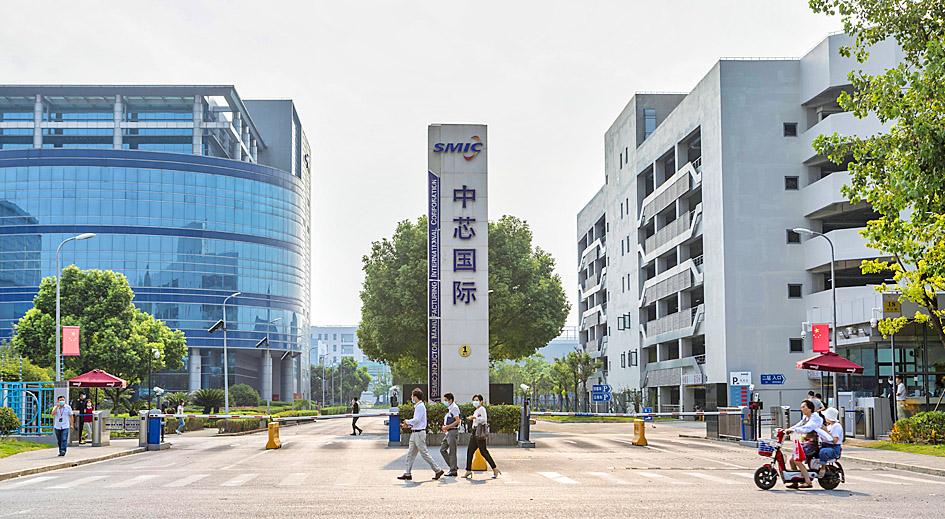Shares of local contract chipmakers yesterday rose as much as the 10 percent daily limit, as investors bet on orders being transferred from Semiconductor Manufacturing International Corp (SMIC, 中芯國際) after the US imposed export restrictions on the Chinese chipmaker.
United Microelectronics Corp (UMC, 聯電) shares soared 10 percent to close at NT$27.5 as 380 million shares changed hands on the Taiwan Stock Exchange.
UMC is the world’s No. 3 foundry by revenue, followed by SMIC, according to data from market researcher TrendForce Corp (集邦科技).

Photo: EPA-EFE
UMC has product and customer portfolios similar to those of SMIC, TrendForce said, adding that UMC offers 14-nanometer and less advanced chips similar to those SMIC provides.
To avoid operational risks, chip designers such as Qualcomm Inc and Broadcom Inc are likely to shift orders to non-Chinese foundries such as GlobalFoundries Inc, Taiwan Semiconductor Manufacturing Co (TSMC, 台積電), UMC or Vanguard International Semiconductor Corp (世界先進), TrendForce analyst Joanne Chiao (喬安) said in an e-mail responding to questions from the Taipei Times.
Smaller local foundry Powerchip Semiconductor Manufacturing Co (力積電) and South Korea’s Samsung Electronics Co are also options, Chiao said.
The potential transfer of orders would worsen already tight supply constraints, with the utilization rate at local foundries already approaching 100 percent, she said.
Vanguard and TSMC shares rose 9.76 percent and 1.77 percent to close at NT$97.8 and NT$431.5 respectively.
Unlisted Powerchip makes CMOS image sensors, DRAM chips and driver ICs used in panels made for smartphones. The firm operates three 12-inch fabs and two 8-inch fabs in Taiwan, as well as a 12-inch fab in China.
A senior semiconductor analyst, who requested anonymity, said “there is an urgent need” for SMIC’s customers to transfer their orders to other contract chipmakers, but that might not provide an immediate revenue boost given their high utilization rates.
The effects of the transfer of orders would likely emerge next year, the analyst said.
It is worth watching to see whether any of the contract chipmakers increase their capital expenditure for next year, the analyst said.
Shares of SMIC, China’s largest chipmaker, yesterday fell 3.88 percent to close at HK$17.86 in Hong Kong trading, a four-month low.

Taiwan Transport and Storage Corp (TTS, 台灣通運倉儲) yesterday unveiled its first electric tractor unit — manufactured by Volvo Trucks — in a ceremony in Taipei, and said the unit would soon be used to transport cement produced by Taiwan Cement Corp (TCC, 台灣水泥). Both TTS and TCC belong to TCC International Holdings Ltd (台泥國際集團). With the electric tractor unit, the Taipei-based cement firm would become the first in Taiwan to use electric vehicles to transport construction materials. TTS chairman Koo Kung-yi (辜公怡), Volvo Trucks vice president of sales and marketing Johan Selven, TCC president Roman Cheng (程耀輝) and Taikoo Motors Group

Among the rows of vibrators, rubber torsos and leather harnesses at a Chinese sex toys exhibition in Shanghai this weekend, the beginnings of an artificial intelligence (AI)-driven shift in the industry quietly pulsed. China manufactures about 70 percent of the world’s sex toys, most of it the “hardware” on display at the fair — whether that be technicolor tentacled dildos or hyper-realistic personalized silicone dolls. Yet smart toys have been rising in popularity for some time. Many major European and US brands already offer tech-enhanced products that can enable long-distance love, monitor well-being and even bring people one step closer to

RECORD-BREAKING: TSMC’s net profit last quarter beat market expectations by expanding 8.9% and it was the best first-quarter profit in the chipmaker’s history Taiwan Semiconductor Manufacturing Co (TSMC, 台積電), which counts Nvidia Corp as a key customer, yesterday said that artificial intelligence (AI) server chip revenue is set to more than double this year from last year amid rising demand. The chipmaker expects the growth momentum to continue in the next five years with an annual compound growth rate of 50 percent, TSMC chief executive officer C.C. Wei (魏哲家) told investors yesterday. By 2028, AI chips’ contribution to revenue would climb to about 20 percent from a percentage in the low teens, Wei said. “Almost all the AI innovators are working with TSMC to address the

Malaysia’s leader yesterday announced plans to build a massive semiconductor design park, aiming to boost the Southeast Asian nation’s role in the global chip industry. A prominent player in the semiconductor industry for decades, Malaysia accounts for an estimated 13 percent of global back-end manufacturing, according to German tech giant Bosch. Now it wants to go beyond production and emerge as a chip design powerhouse too, Malaysian Prime Minister Anwar Ibrahim said. “I am pleased to announce the largest IC (integrated circuit) Design Park in Southeast Asia, that will house world-class anchor tenants and collaborate with global companies such as Arm [Holdings PLC],”